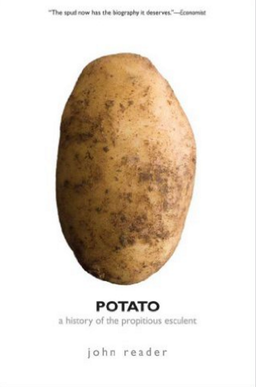The Propitious Esculent
The Propitious Esculent: The Potato in World History is a book written by John Reader that explores the history and impact of the potato on global development. The book was published in 2008 and provides a comprehensive examination of the potato's role in shaping economies, societies, and cultures around the world.
Overview[edit | edit source]
The book delves into the origins of the potato in the Andes of South America, where it was first domesticated by the Inca Empire. It traces the journey of the potato from its early cultivation to its introduction to Europe by Spanish explorers in the 16th century. The potato's adaptability to different climates and soils made it a staple crop in many countries, significantly influencing agricultural practices and food security.
Impact on Europe[edit | edit source]
The introduction of the potato to Europe had profound effects on the continent's agriculture and population growth. The crop's high yield and nutritional value helped alleviate famines and supported population booms in countries like Ireland, Germany, and Russia. The book discusses the Great Irish Famine of the 1840s, caused by the potato blight, and its devastating impact on the Irish population.
Economic and Social Influence[edit | edit source]
Reader examines how the potato contributed to the Industrial Revolution by providing a cheap and reliable food source for the growing urban workforce. The book also explores the social and cultural significance of the potato in various societies, highlighting its role in traditional dishes and culinary practices.
Scientific and Agricultural Advances[edit | edit source]
The book covers the scientific advancements related to potato cultivation, including the development of disease-resistant varieties and modern agronomy techniques. It also addresses contemporary issues such as genetically modified organisms (GMOs) and the future of potato farming in the face of climate change.
Conclusion[edit | edit source]
The Propitious Esculent provides a detailed and engaging account of the potato's journey from a humble tuber to a global food staple. It underscores the importance of the potato in world history and its ongoing relevance in addressing food security challenges.
See also[edit | edit source]
- History of the potato
- Potato blight
- Inca Empire
- Great Irish Famine
- Agronomy
- Genetically modified organisms
References[edit | edit source]
External links[edit | edit source]
Search WikiMD
Ad.Tired of being Overweight? Try W8MD's physician weight loss program.
Semaglutide (Ozempic / Wegovy and Tirzepatide (Mounjaro / Zepbound) available.
Advertise on WikiMD
|
WikiMD's Wellness Encyclopedia |
| Let Food Be Thy Medicine Medicine Thy Food - Hippocrates |
Translate this page: - East Asian
中文,
日本,
한국어,
South Asian
हिन्दी,
தமிழ்,
తెలుగు,
Urdu,
ಕನ್ನಡ,
Southeast Asian
Indonesian,
Vietnamese,
Thai,
မြန်မာဘာသာ,
বাংলা
European
español,
Deutsch,
français,
Greek,
português do Brasil,
polski,
română,
русский,
Nederlands,
norsk,
svenska,
suomi,
Italian
Middle Eastern & African
عربى,
Turkish,
Persian,
Hebrew,
Afrikaans,
isiZulu,
Kiswahili,
Other
Bulgarian,
Hungarian,
Czech,
Swedish,
മലയാളം,
मराठी,
ਪੰਜਾਬੀ,
ગુજરાતી,
Portuguese,
Ukrainian
Medical Disclaimer: WikiMD is not a substitute for professional medical advice. The information on WikiMD is provided as an information resource only, may be incorrect, outdated or misleading, and is not to be used or relied on for any diagnostic or treatment purposes. Please consult your health care provider before making any healthcare decisions or for guidance about a specific medical condition. WikiMD expressly disclaims responsibility, and shall have no liability, for any damages, loss, injury, or liability whatsoever suffered as a result of your reliance on the information contained in this site. By visiting this site you agree to the foregoing terms and conditions, which may from time to time be changed or supplemented by WikiMD. If you do not agree to the foregoing terms and conditions, you should not enter or use this site. See full disclaimer.
Credits:Most images are courtesy of Wikimedia commons, and templates, categories Wikipedia, licensed under CC BY SA or similar.
Contributors: Prab R. Tumpati, MD

